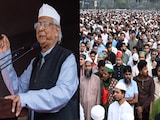The title of King Charles' wife, Queen Consort Camilla, is expected to change post his coronation ceremony in May, as per a report in the Independent.
Camilla Parker-Bowles has been married to King Charles since 2005 and was known as the Duchess of Cornwall until the death of Queen Elizabeth II in September last year. She had decided to not use the title of 'Princess of Wales' which was used by the King's first wife, Princess Diana.
As per the outlet, the title was previously known as "Princess Consort," but Queen Elizabeth II stated that it was her "sincere wish" that the Duchess of Cornwall be known as Queen Consort when her son Charles becomes King.
It is to be noted that the British crown can only be inherited, hence the people who marry into the royal family are not eligible to succeed to the throne.
In a letter in February 2022, Queen Elizabeth II stated that she supported Camilla as she "continues her own loyal service". The former monarch said, "I would like to express my thanks to you all for your support. I remain eternally grateful for, and humbled by, the loyalty and affection that you continue to give me."
She continued, "And when, in fullness of time, my son Charles becomes King, I know you will give him and his wife Camilla the same support that you have given me; and it is my sincere wish that, when that time comes, Camilla will be known as Queen Consort as she continues her own loyal service."
Also Read: UK's Queen Consort Camilla Chooses Crown Without Kohinoor For King Charles' Coronation
King Charles and Camilla will be crowned alongside one another during the coronation ceremony on May 6. The Royal website states, "Unless decided otherwise, a Queen consort is crowned with the King, in a similar but simpler ceremony. If the new Sovereign is a Queen, her consort is not crowned or anointed at the coronation ceremony."
According to Buckingham Palace, the Queen Consort's primary responsibility is to be the Monarch's companion and source of emotional and practical support. The consort does not hold a formal position in the structure of government, see papers or hold official audiences.















